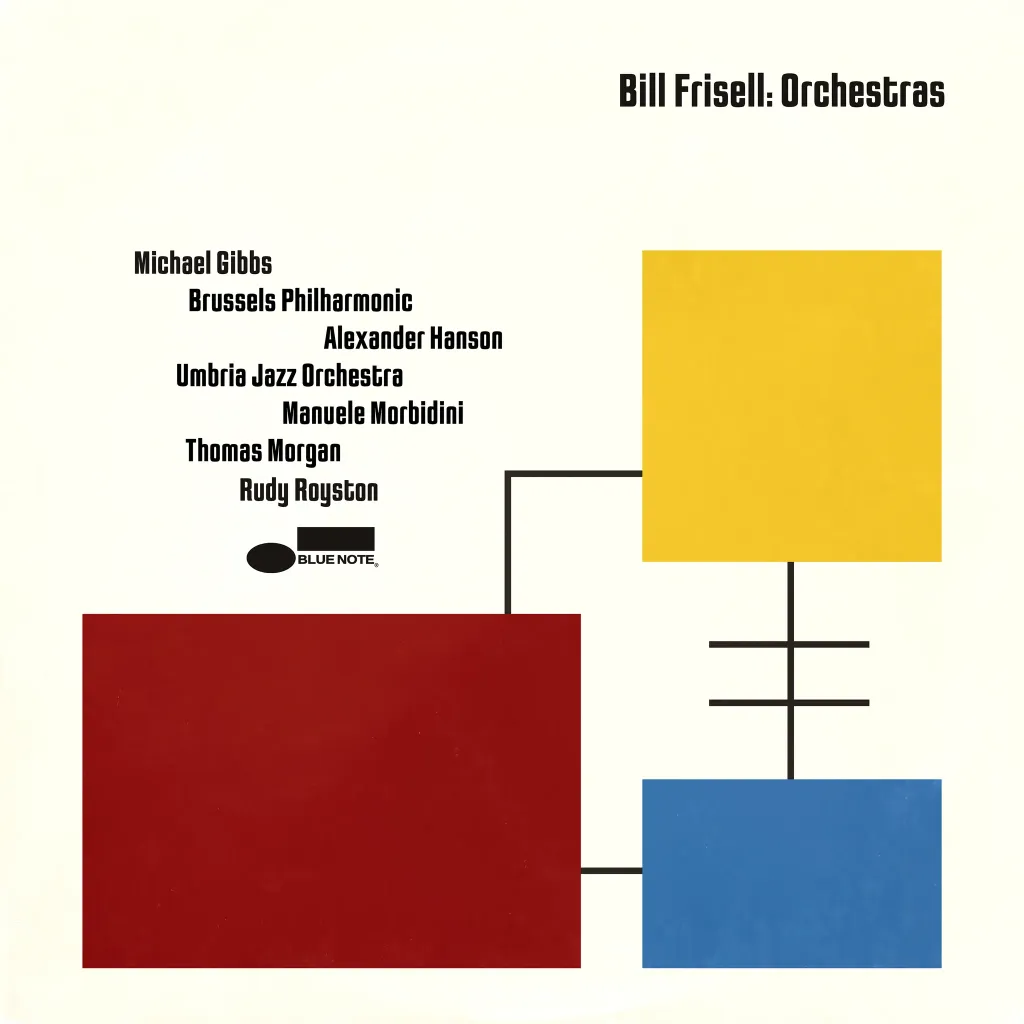“Mike Gibbs’s contribution to Orchestras should be considered as one of his greatest achievements!” writes Ed Puddick. The album ‘Bill Frisell: Orchestras’ will be released on 19 April on Blue Note, so we asked Ed, Mike’s closest collaborator in recent years, to tell the complex story of the genesis of this album: a major Gibbs work by any standards, and certainly one of the crowning glories of the 86-year old composer’s career.
Ed Puddick writes: To understand the magnitude of Mike Gibbs’ latest recording milestone, we have to go back to 2019, two years after Mike celebrated his 80th birthday, and a year before the world was plunged into the darkness of the Covid-19 pandemic. Charles Lloyd invited Mike to write seven orchestral arrangements for a concert at the Jazztopad festival in Wrocław, Poland. My role was to assist with the production of scores and parts for this project, allowing me a unique insight into the working practices of someone who has been my teacher, mentor and friend since we first met in 2001.
Mike had previously written string arrangements for Lloyd’s multimedia Red Waters, Black Skies project, but the lead sheets from which these new orchestrations were to be developed were sketchy and seemed purposefully vague. Integrating such a free approach to both composition and improvisation, with the traditional expectations of a full symphony orchestra, would challenge even the most experienced of arrangers. I’m not sure if Mike would consider this project to have been a total success, but it certainly informed what would come next.
Twelve months later, in 2020, there was talk of another orchestral project, this time with Bill Frisell in Brussels, revisiting an idea from 2009 when the BBC Symphony Orchestra provided the platform as part of the London Jazz Festival. Orchestral dates in Belgium were to be preceded by a gig at the Umbria Winter Jazz Festival with Bill, his trio and a big band of Italian jazz musicians. I would be involved again, assisting Mike with various aspects of both projects, sending parts and scores to orchestral librarians and liaising project producers. It was exciting to hear about Mike’s conversations with Bill as they started to select the repertoire for both projects. So, despite rumours of a possible new coronavirus coming out of China, 2020 was shaping up to be just another normal and busy year in Mike’s career, similar to the previous 58!
Unfortunately, as the Covid-19 pandemic took hold, dates were pushed back and ideas put on pause. Mike’s year went from busy to empty in the blink of an eye. Just as so many professional musicians were finding themselves with an unprecedented amount of time to commit to writing those projects they’d been ruminating on for years, composers and arrangers like Mike suddenly found themselves with nothing to write for. And then there was the passing of so many musicians and industry figures who Mike knew as friends, colleagues and musical heroes. Among them were Hal Willner and Lee Konitz, and more recently, Wayne Shorter and Carla Bley.
Despite this sadness, Mike remained just as Frisell describes him: an “uplifter, positive thinker, enthusiastic harmoniser,” and he continued to dream of the arrangements that would, hopefully, one day be written and played by Bill with the orchestras. You can hear that optimism at many points in these recordings – just check out the playful clarinets in ‘RAG,’ first heard at 03:15.
During the lockdowns, Mike would obsess over recordings of tunes that he planned to orchestrate, such as Bill’s duo performance of ‘Lush Life’ with Thomas Morgan from the live album Epistrophy, which he asked me to transcribe for him. My transcription didn’t feature in the final arrangement, but I like to think that it played a small part in Mike’s sensational orchestration. Check out the bridge (starting at 02:14) and hear the violas and cellos repeatedly leaning on the dark flat sixth (Db) of F-minor, only for the violins to respond with two beautifully placed harmonics (G and D). That’s Mike’s unmistakable harmonic sensibility and mastery of orchestration summed up in four bars!
As lockdowns eased and restrictions lifted, 2021 dates were hesitantly confirmed: September for Brussels, December for Umbria. Mike had deadlines again but still very little certainty. The cancellation of the Brussels concerts felt inevitable (large orchestras were struggling to find practical solutions to social distancing limitations) but Umbria, with the smaller ensemble, looked like it would actually go ahead. After so many months of inactivity there was a sudden rush to get scores completed, parts prepared, and PDFs sent. Mike was back in full flow, and each score that came my way was bursting with wonderful surprises and new inspiration, as well as familiar Gibbsian traits.
In December 2021, in the midst of the Omicron wave of Covid infections, Mike travelled to Italy for the Umbria concert, only to be quarantined on arrival. After a few days of solitude in a hotel room, he returned home, having missed the rehearsals and concerts, as well as the precious chance to be reunited with Bill and other collaborators.
Rescheduled Brussels dates in September 2022 allowed more time for arrangements to be written and re-written. This included Mike’s orchestration of Bill’s most famous composition ‘Throughout.’ Mike had previously written an arrangement of this piece for the NDR Big Band, but this orchestral version says something profound about their relationship. It becomes impossible to hear where the composition ends and the arrangement begins, and where the arrangement stops and the improvisation takes over. The tune is distinctively Bill’s, but the descending line in the clarinet – 48 seconds into the piece, with its G-natural over Amaj7 – is pure Gibbs.
After just over two minutes, the way in which the chords seem to start merging together could be thanks to a skilfully controlled guitar pedal, or the subtle touch of the arranger. Towards the end of the recording, Bill even references what Mike had written for the bassoons, tuba and strings in his improvisation. Can there be a more meaningful way for a soloist to acknowledge the arranger?
So, nearly three years after the idea had been proposed, the orchestral concerts went ahead without disruption, and the results of both projects are now available for all to hear – but I can’t help feeling that these recordings only really tell half the story. For me, this album will forever be a reminder of how a man in his eighties, who had already achieved so much in a career spanning many decades, found the inner strength and motivation to overcome isolation and uncertainty to conquer one of his most challenging assignments. Mike’s arrangements for Bill are defined by their heartfelt sincerity and deceptive simplicity. In truth, they are as complex as the circumstances that surrounded them. For someone who has enjoyed so many successes throughout his career, Mike’s contribution to ‘Orchestras’ could be mistaken as being insignificant when, in fact, it should be considered as one of his greatest achievements.



7 responses
What a beautifully written and insightful summary. Totally inspiring.
Thanks Scott! Hope you’re well. Ed
Many thanks. An invaluable insight and overview.
A great and insightful piece. Can’t wait to hear this.
Great, how can i listen to Mike Gibbs music
The album is released today 19 April.